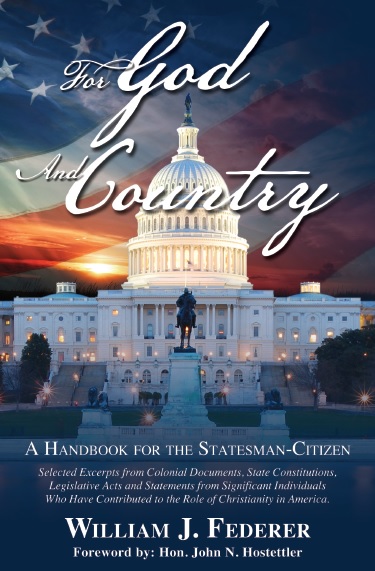|
American Minute
“Foundations of our nation were laid by civilized men, by Christians … To ridicule them is national suicide”-McGuffey’s Reader, 1907
|

Selling a million copies a year for over 100 years, McGuffey’s Readers were the mainstay of public education in America.
Generations of school children read them, making them some of the most influential books of all time. They were written by William McGuffey, who died MAY 4, 1873.
Considered the “Schoolmaster of the Nation,” McGuffey was a professor at the University of Virginia and president of Ohio University. He began one of nation’s first teachers’ associations. In the foreword of McGuffey’s Reader, 1836, he wrote: “The Christian religion is the religion of our country. From it are derived our prevalent notions of the character of God, the great moral governor of the universe. On its doctrines are founded the peculiarities of our free institutions.” McGuffey added: “The Ten Commandments and the teachings of Jesus are not only basic but plenary (complete).”
McGuffey’s Eclectic Sixth Reader, 1907, included a quote from Lyman Beecher: “While most nations trace their origin to barbarians, the foundations of our nation were laid by civilized men, by Christians … The memory of our fathers should be the watchword of liberty throughout the land; for, imperfect as they were, the world before had not seen their like, nor will it soon, we fear, behold their like again. Such models of moral excellence, such apostles of civil and religious liberty … To ridicule them is national suicide.”
McGuffey’s Eclectic First Reader included a lesson “Evening Prayer”: “At the close of the day, before you go to sleep, you should not fail to pray to God to keep you from sin and from harm … You should thank him for all his good gifts; and learn, while young, to put your trust in Him; and the kind care of God will be with you.”
William Holmes McGuffey, in McGuffey’s Fifth Eclectic Reader (revised edition, 1879, Lesson XXIII), had the article “King Charles II and William Penn” by Mason L. Weems: “King Charles: How then will you get their lands? William Penn: I mean to buy their lands of them. King Charles: Buy their lands of them? Why, man, you have already bought them of me! … William Penn: … How can I, who call myself a Christian, do what I should abhor even in the heathen? No … I will buy the right of the proper owners, even of the Indians themselves. By doing this, I shall imitate God himself in his justice and mercy, and therby insure His blessing on my colony, if I should ever live to plant one in North America.” William Holmes McGuffey’s Fifth Eclectic Reader (revised edition, 1879, Lesson LXV, pp. 200-204) memorialized John Peter Gabriel Muhlenburg in a poem titled “The Rising” written by Thomas Buchanan Read:
He spoke of wrongs too long endured, The stirring sentences he spake And, rising on his theme’s broad wing, In McGuffey’s 5th Eclectic Reader, 1879, is a lesson by William Ellery Channing, titled “Religion-The Only Basis of Society”: “How powerless conscience would become without the belief of a God … Erase all thought and fear of God from a community, and selfishness and sensuality would absorb the whole man. Appetite, knowing no restraint … would trample in scorn on the restraints of human laws … Man would become … what the theory of atheism declares him to be — a companion for brutes.” William Holmes McGuffey’s Fifth Eclectic Reader, 1879, included Lesson CXIII, “A Picture of Human Life” by Samuel Johnson: “Temptation succeeds temptation, and one compliance prepares us for another; we, in time, lose the happiness of innocence, and solace our disquiet with sensual gratifications. By degrees we let fall the remembrance of our original intention, and quit the only adequate object of rational desire. We entangle ourselves in business, immerse ourselves in luxury, and rove through the labyrinths of inconstancy till darkness of old age begins to invade us, and disease and anxiety obstruct our way. We then look back upon our lives with horror, with sorrow, and with repentance; and wish, but too often vainly wish, that we had not forsaken the paths of virtue.” Read the America Minute archives |
|
Click to shop AMERICAN MINUTE store
Invite Bill Federer to speak: wjfederer@gmail.com 314-502-8924
|










